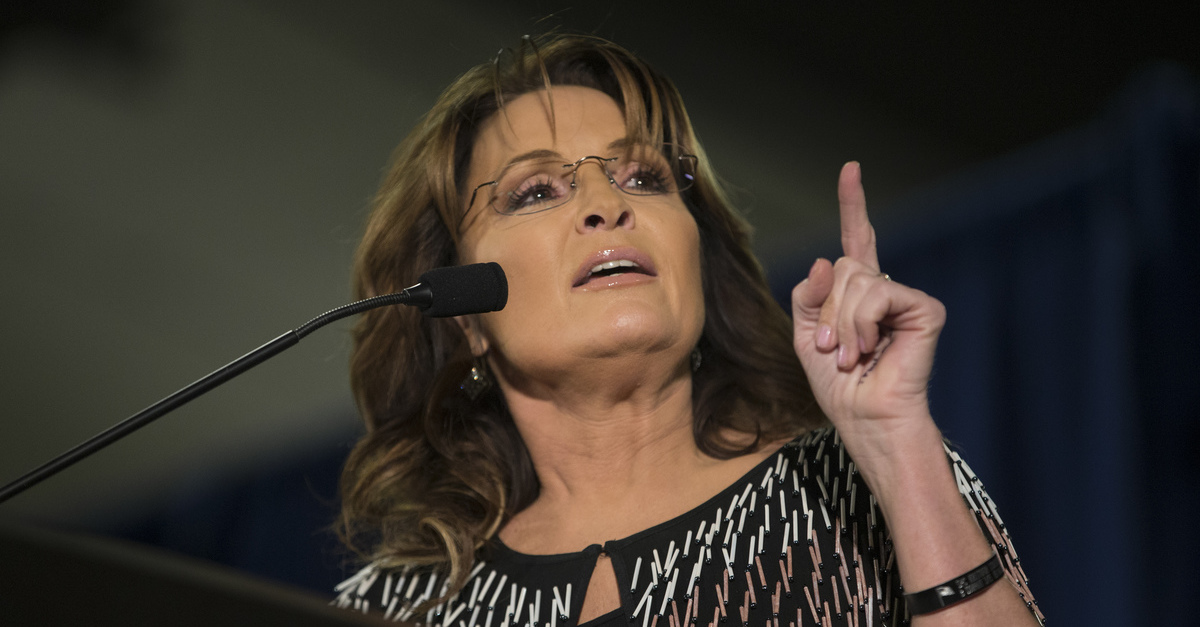
AMES, IA – JANUARY 19: Former Alaska Gov. Sarah Palin speaks at Hansen Agriculture Student Learning Center at Iowa State University on January 19, 2016 in Ames, IA. Palin endorsed Donald Trump’s run for the Republican presidential nomination.
In early November, New York lawmakers revised a statute designed to punish those who file retaliatory lawsuits against free speech. The actual malice standard under that law can be applied to former Alaska Governor Sarah Palin’s defamation case against the New York Times, a federal judge ruled on Tuesday.
Though the immediate consequences of the ruling are unclear, it could lay the foundation for the former Republican vice presidential nominee paying the Times’ legal bills if she loses her case.
“The Legislature conveyed a sense of urgency by directing that the amendment was to ‘take effect immediately,'” U.S. District Judge Jed Rakoff wrote in a 13-page opinion, adding that last month’s amendments were “intended to correct the narrow scope of New York’s prior anti-SLAPP law.”
Short for “strategic lawsuits against public participation,” anti-SLAPP statutes are intended to prevent the powerful from suing their critics into silence. The prior iteration of the law had clamped down on real estate disputes and controversies over permits and applications.
New York State Senator Brad Hoylman, a Democrat whose district includes Manhattan’s Greenwich Village, amended the statute more broadly “to provide the utmost protection for the free exercise or speech, petition, and association rights, particularly where such rights are exercised in a public forum with respect to issues of public concern.”
New York Governor Andrew Cuomo (D) was similarly emphatic when he signed the bill.
“For too long, powerful and wealthy interests have used frivolous lawsuits to harass and intimidate critics by burdening them with exorbitant legal fees and time consuming legal processes,” Cuomo remarked on Nov. 10, when it was signed. “That ends now.”
Since its enactment, Palin argued that the revision did not apply to her, but Rakoff found that it had retroactive effect.
Times attorney David McCraw forwarded the inquiry to a spokeswoman who said the paper is pleased with the ruling.
The Times has not yet invoked the provision of the bill that would allow it to collect fees, and it is unclear whether they can try to do so in federal court, Rakoff added in a footnote.
But the paper emphasized that they are considering that strategy in a prior motion to the judge.
“All apart from establishing whether defendants could have a cause of action against plaintiff for recovery of attorney’s fees and other damages if she ‘maintains’ this action, a ruling now on the applicability of state law will inform the drafting of jury instructions at trial, simplify future proceedings including on appeal, and, more generally, give effect to the principle that, ‘where possible, courts will render decisions on federal constitutional questions unnecessary by resolving cases on the basis of state law (whether statutory or constitutional),'” Times attorney Jay Brown wrote late last month.
The ruling raises the stakes of a three-year battle that has been broiling since the Times published an editorial titled “America’s Lethal Politics” on June 15, 2017, about the connection between overheated rhetoric and mass violence. The editorial appeared to lay Jared Lee Loughner’s massacre at Palin’s feet, noting that her political action committee disseminated a map that put crosshairs over the electoral district of one of his victims: Congresswoman Gabrielle Giffords, an Arizona Democrat.
Even though the Times quickly corrected the story—noting that no evidence ever emerged that Loughner was inspired by the ad—Palin quickly sued for defamation, and the case see-sawed through the Southern District of New York for years. The Times won an early dismissal, before the Second Circuit Court of Appeals revived the case last year.
Judge Rakoff found the lawsuit fit for a jury this past summer, setting a trial date for June 21, 2021.
In addition to the federal defamation burden of proof, Palin must now meet the bar set by New York’s revised analogue: “that defendants made the allegedly defamatory statements in the editorial ‘with knowledge of [their] falsity or with reckless disregard of whether [they were] false’ — that is, with actual malice.”
An initial press inquiry to Palin’s counsel went to an attorney who is no longer representing her. Her current counsel did not immediately respond to an email requesting comment.
Read the ruling below:
[Image via Aaron P. Bernstein/Getty Images]